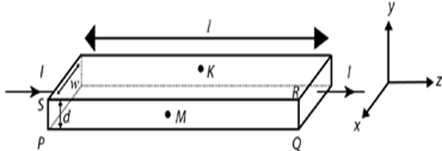Question
Question: Consider two different metallic strips (1 and 2) of the same material. Their lengths are the same, w...
Consider two different metallic strips (1 and 2) of the same material. Their lengths are the same, widths are w1 and w2 , and thicknesses are d1 and d2 respectively. Two points K and M are symmetrically located on the opposite faces parallel to the x-y plane. V1 and V2 are the potential difference between K and M in strips 1 and 2 respectively. Then, for a given current I flowing through them in a given magnetic field strength B, the correct statement(s) is(are):

(A)if,w1=w2 and d1=2d2 ,then V2=2V1
(B)if,w1=w2 and d1=2d2 ,then V2=V1
(C)if,w1=2w2 and d1=d2 ,then V2=2V1
(D)if,w1=2w2 and d1=d2 ,then V2=V1
Solution
We know that the current carries electrons as charges. This means that inside the magnetic field, the electrons will experience a force. Since, the current is given to be constant, that is, steady with time it means that the net magnetic force on the electron is cancelled by the net electric force on it.
Complete answer:
Before starting the problem, let us assign some parameters some terms:
Let the electric field be given byE .
Let the drift velocity of the electrons inside the region be vd .
Now, at first we equate the net force on moving charges that are the electrons. Doing so, we get:
⇒qvdB=qE
Here, the electric field (E) can be written as:
⇒E=wV , where w is the width of the metallic strip.
Thus, our equation now becomes:
⇒vdB=wV⇒V=wvdB
Now we use the formula of drift velocity, that is stated below:
⇒vd=neAI⇒vd=ne(wd)I
As the area crossed by the electrons is (wd)
Therefore, the potential difference now is:
⇒V=wB(newdI)⇒V=nedB
Thus, the potential difference is inversely proportional to the thickness (d).
Also, the potential difference is independent of the width (w) of the metallic strips.
Thus, we can write:
⇒V1d1=V2d2
Therefore for, d1=2d2 , we get:
⇒V2=2V1
And for, d1=d2
⇒V1=V2
Hence, for d1=2d2 we get V2=2V1 and for, d1=d2 we get V1=V2 .
Hence, options (A) and (D) are the correct options.
Note:
We need to be very careful while performing these lengthy calculations, as one mistake could make our whole answer incorrect. Also, we should always remember the derivation of formulas as they are sometimes very useful in solving problems where we need to start from the very basics.
